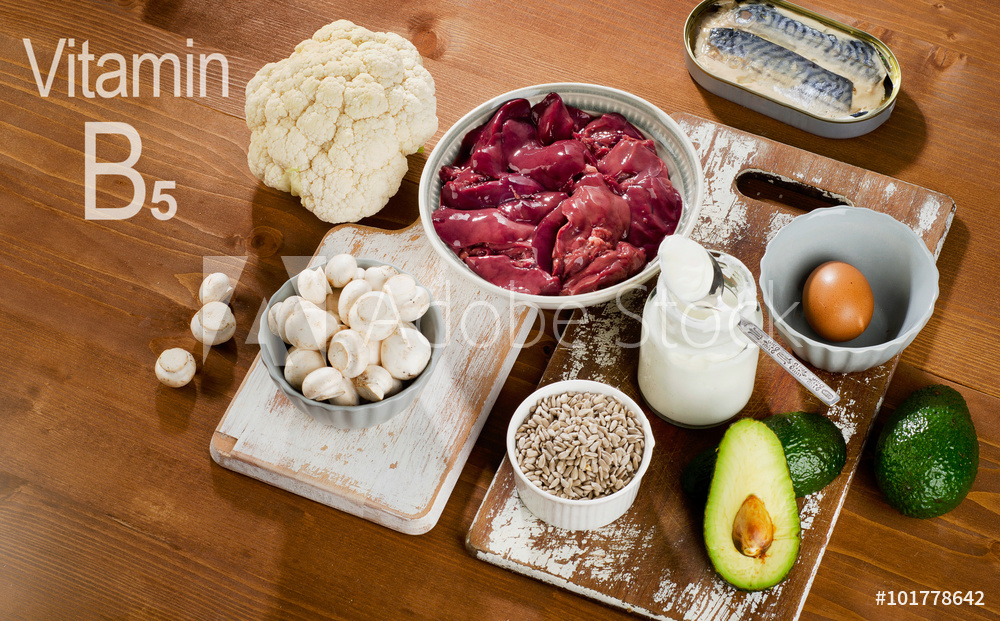Pantothenic acid, also called vitamin B5 (a B vitamin), is a water soluble vitamin. Pantothenic acid is an essential nutrient.
Its name derives from the Greek pantothen, meaning “from everywhere”, and small quantities of pantothenic acid are found in nearly every food, with high amounts in fortified whole grain cereals, egg yolks, liver and dried mushrooms. It is commonly found as its alcohol analog, the provitamin pantheol (pantothenol), and as calcium pantothenate. Pantothenic acid was discovered by Roger J Williams in 1933.

It is widely known to be beneficial in treating serious mental disorders like chronic stress and anxiety. A healthy diet should contain an appropriate amount of it to ensure good health and proper functioning of all the organ systems. It performs a wide variety of functions in our body, including the production of neurotransmitters in the brain, the fabrication of steroids, and the extraction of fats, proteins and other vital nutrients from food.
Symptoms of Vitamin B5 Deficiency —
The most common and irritating symptom of its deficiency is burning foot syndrome, in which a person experiences lack of feeling in their feet, accompanied by intense inflammatory pain. Along with this comes a constant feeling of fatigue and weakness throughout the body. Other major symptoms include insomnia, anemia, vomiting, contraction of muscles and abnormal skin developments.
Health Benefits of Vitamin B5 —
Synthesizer —
- Vitamin B5 acts as a synthesizer of many important components required by the human body.
- For instance, it is essential for the formation of fats, proteins, carbohydrates, amino acids and antibiotics, while also stimulating adrenal hormones.
Stress Reducer —
- In addition, the Vitamin has the reputation of reducing stress and other serious mental problems like anxiety and depression, which ensures fitness of mind.
- It does this by regulating the hormones responsible for causing these mental conditions.
Heart Health —
- It has an impressive record of keeping the human heart in normal working condition.
- Furthermore, it regulates the level of cholesterol and also helps in controlling blood pressure.
Builds Stamina —
- Not to mention, it helps in reducing body fatigue and weariness and it sets the metabolic activities of the entire body on the right track.
- This means that this vitamin is capable of increasing the stamina of the human body to perform various tasks in an efficient and healthy way.
Skin and hair —
- More than anything else, Vitamin B5 helps to keep the skin healthy and attractive in appearance. It also helps to delay the appearance of premature aging signs on the skin like wrinkles and age spots.
- Studies have also shown that Vitamin B5 plays an important role in the pigmentation of hair and prevents it from losing its color until you are well into your older years.
Water Solubility —
- Since Vitamin B5 belongs to the group of water soluble vitamins, it does not add any type of toxic substance to the human body, thereby proving to be beneficial and effective for people from every age group and either gender.
Immune System Health —
- As a matter of fact, Vitamin B5 is very good at strengthening the immune system of the human body. This helps us fight against a number of infections and diseases.
- Moreover, it helps decrease the chances of your body contracting something dangerous, be sure that your white blood cell count is maximized and your immune system is functioning properly by eating foods that are rich in vitamin B5.
Other Benefits —
- Besides, it helps to relieve the human body from a number of detrimental problems like asthma, autism candedeases, osteoarthritis, Parkinson’s disease, premenstrual syndrome and many more.
Hemoglobin Levels —
- In addition, Vitamin B5 has been shown to enhance the level of hemoglobin in our bodies.
- It also assists the liver in metabolizing toxic substances. Finally, it is a fuel source for cell division and DNA reproduction.
Sources –
- Sun flower seeds
- Avocados
- Sun-dried tomatoes
- Corn
- Broccoli
- Mushrooms
- Cauliflower
- Chicken
- Sweet potato
- Eggs
- Milk
- Soybeans
Recommended daily intake and sources —
Experts recommend daily intakes of vitamin B5 recommend:
- Infants 0-6 months – 1.7 milligrams (mg) per day
- Infants 7-12 months – 1.8 mg per day
- Children 1 -3 years – 2 mg per day
- Children 4-8 years – 3 mg per day
- Children 9-13 years – 4 mg per day
- Males and females 14 years and over – 5 mg per day
- Pregnant women – 6 mg per day
- Breastfeeding women – 7 mg per day
Source —
- Pantothenic_acid
- foods-high-in-pantothenic-acid-vitamin-B5
- vitamin-b5-or-pantothenic-acid
- top-10-vitamin-b5-foods-pantothenic-acid
Hello!!
I’m Dr. Malini Bhat MD (Ayu); an Ayurvedic Doctor and a health blogger. Follow me on social media to get daily health tips which you can easily adapt to a healthy lifestyle.
Great Post
Thank you Sir 🙂